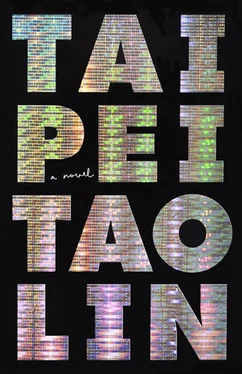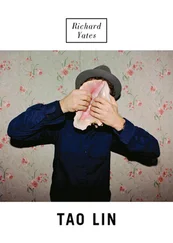Walking alone, to his room, an hour later, he realized he was deriving comfort from the existence, in his life, of a “backup prospect.” There was a specific girl he liked who liked him back, but he couldn’t remember who, it seemed. When he realized he’d been thinking of Anton, that he’d unconsciously de-gendered and abstracted Anton into a kind of silhouette, which he’d successfully presented to himself as a romantic prospect, he grinned uncontrollably for around thirty seconds, almost getting hit by a minivan when, rerouting to a darker street to better hide his face, he jogged somewhat recklessly across an intersection.
Paul felt more committed, after that, to viewing the time until September as an interim period, and didn’t have an in-person conversation for more than a week, during which, to his own approval, he seemed to be settling, if precariously, with two days spent mostly eating, into a somewhat productive, loneliness-free routine. He remembered while peeling a banana one night that he had committed, months ago, to a reading in April — in three days, he learned from the internet, in a building near Times Square.
At the reading, after arriving ten minutes early by accident and talking to the organizer, then sitting alone and, to appear occupied, holding a pen and staring down at what he’d printed in the library — an account of his visit to Taiwan, four months ago — where he planned to return immediately after he and Frederick, an author in his early 40s, finished reading, Paul began to feel sleepy, in his seat. Yawning, he looked up and recognized Mitch, 26, a classmate from middle/ high school in Florida, where they had mutual friends but had never spoken to each other, that Paul could remember, approaching from a conspiratorially far distance, like an FBI agent but slower. Mitch had messaged on Facebook, a few weeks ago, that he might attend this reading.
“You look the same. What about me?”
“Taller,” said Mitch seeming a little nervous.
“How can you tell? I’m sitting.”
“The shape of your legs, and your body, I think. Something about your bone structure.”
After the reading Lucie, 23, introduced herself and Amy, 23, and Daniel, 25, to Paul and Mitch, saying something about her and Amy’s online magazine. Paul asked if they had business cards, not thinking they would. Amy, after encouragement from Lucie, reluctantly gave Paul a business card, seeming a little embarrassed. When Paul looked up from the business card, putting it in his back pocket, he was startled by the sudden appearance of Frederick smiling at him with his arm around Lucie in a manner that seemed calculated, but wasn’t, Paul knew, to firmly establish they were “together.” A bewildered-seeming, middle-aged woman with an Italian accent asked Paul something about agave nectar, wanting it for a diabetic friend, it seemed. Paul said he’d actually learned, a few months ago, that it raised blood sugar as intensely as sugar and that he’d mailed his mother unheated, unfiltered honey, which was the healthiest sweetener — for diabetics, or anyone — based on what he currently knew, which could be wrong, he also knew.
In a taxi to a party, forty minutes later, Paul imagined another him walking toward the library and, for a few seconds, visualizing the position and movement of two red dots through a silhouetted, aerial view of Manhattan, felt as imaginary, as mysterious and transitory and unfindable, as the other dot. He visualized the vibrating, squiggling, looping, arcing line representing the three-dimensional movement, plotted in a cubic grid, of the dot of himself, accounting for the different speed and direction of each vessel of which he was a passenger — taxi, Earth, solar system, Milky Way, etc. Adding a fourth dimension, representing time, he visualized the patterned scribbling shooting off in one direction, with a slight wobble, miles from where it was seconds ago. He imagined his trajectory as a vacuum-sealed tube, into which he’d arrived and through which — traveling alone in the vacuum-sealed tube of his own life — he’d be suctioned and from which he’d exit, as a successful delivery to some unimaginable recipient. Realizing this was only his concrete history, his public movement through space-time from birth to death, he briefly imagined being able to click on his trajectory to access his private experience, enlarging the dot of a coordinate until it could be explored like a planet.
At the party, which was mostly people in their 30s and 40s, Paul asked Amy an open-ended question about her parents. When she began, after a pause, to answer, he moved his phone from his pants pocket to his ear. “Hello,” he said in a clear voice, and felt physically isolated, like he was wearing a motorcycle helmet, as he peripherally observed Amy moving her wine, almost spilling it, to her mouth.
“Just kidding,” said Paul. “No one called me.”
Amy had a glassy, disoriented expression.
“I don’t have a phone call,” said Paul.
“That was good,” said Amy looking away.
“Just kidding,” said Paul grinning weakly.
The rest of the party, after briefly talking to Lucie, who invited him and Mitch to a party next week at her apartment, Paul talked mostly to Daniel, who had enough money from selling marijuana in San Francisco that he hadn’t had a job since moving here last autumn. Paul asked if Daniel liked drugs. Daniel said he liked “benzos” and opiates. Paul asked if he liked Rilo Kiley and he became quiet a few seconds, seeming worried, like he might not be able to answer, before saying “um, not really.”
Paul went with Daniel, the next night, to a BBQ-themed party, where their main focus, soon after arriving, was on discerning how to leave tactfully, considering how much food they’d eaten and how little they were contributing to conversation, for a party at Kyle and Gabby’s apartment. Standing in a kitchen, at one point, while Daniel was outside smoking, Paul felt like a shark whose eyes have protectively “glossed over” during a feeding frenzy, as he mechanically ate salad, cheese, a burger, apple pie, chips while vaguely focused on not doing anything to cause others to talk to him.
At Kyle and Gabby’s apartment — his first time back since moving out — Paul uncharacteristically approached an intriguing, attractive stranger named Laura and asked her questions with a serious expression, standing at a maybe too-close distance, as if after an unskillful teleportation he didn’t want to underscore by fixing. Laura was here with her friend Walter, who knew Gabby. Paul could see that Laura, who wasn’t looking at him, didn’t like his presence and was getting annoyed, but due to alcohol he felt unaffected by this information and kept asking questions, including her age and what college, if any, she attended, or had attended. As Laura’s annoyance intensified to a slightly curious disbelief she became extra alert — focusing exclusively on Paul with a challenging, vigilante expression. She asked why he was asking so many questions.
“I’m not. I’m just trying to talk.”
“Why are you interrogating me?”
“I’m just trying to have a conversation.”
“What college did you go to?” said Laura accusatorily.
“New York University. How old are you?”
Laura walked away, somewhat aimlessly, into the room Paul crawled across the first time he saw Michelle cry — around a year ago, he realized. In the room now was a king-size bed, which occupied maybe 80 percent of its surface. Paul was sitting alone, at the snack table, thirty minutes later, when Laura approached with a bored expression, unaware of his presence until he stood and said “I highly recommend the Funyuns” in an exaggeratedly helpful voice, choosing Funyuns — corn in the shape and flavor of fried rings of onion — somewhat randomly from the eight to twelve snacks on the table.
Читать дальше












